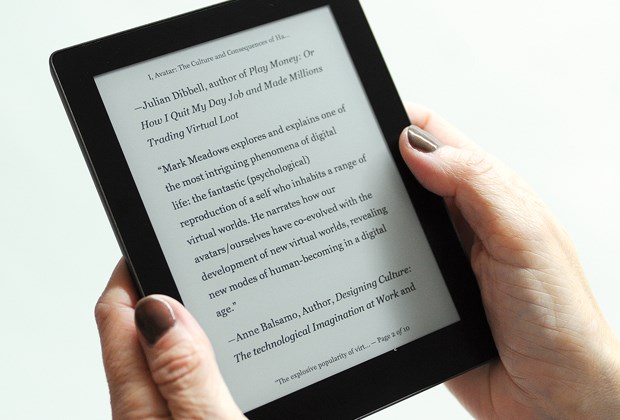In past columns I railed against the trend toward larger screens for smartphones.
I also expressed a preference for tablets over e-readers for reading digital books.
I've moved my thinking on both.
First to the e-readers: I always thought e-readers like Amazon's Kindle and the Kobo were good devices but not for me. I had an excellent small tablet, the Nexus 7, which was light and portable and had useable apps for buying and reading books from the major e-book vendors. I had to carry only one device around with me for all my communication and media needs and brief attempts to use e-readers didn't convince me otherwise. For one thing, I didn't like the transition for page turns on e-readers, where the text of a page flashes away quickly to be replaced by the next page.
But recently I had a chance to try out a Kobo Aura e-reader for a few weeks. To my surprise, reading with it was a pleasure. After returning the loaner, I bought its larger sibling, the Aura HD, for my own use.
Why? Compared to tablets, e-readers are just better for reading books. In a world in which we crave devices that can do everything, single-purpose devices allow us that rare experience in modern life: focus.
Reading an e-book on a tablet receiving communication signals from the Internet is like reading a book with a half-dozen friends gathered around you continually interrupting you to talk about the Canucks, Harper, beer and the latest pictures of their dog. A tablet has too many temptations - from Facebook to Netflix to Angry Birds - that distract me from reading.
I used the Aura while at home in bed, eating lunch in a BC Ferries cafeteria and by a fire while camping. The screen was easy on the eyes. The battery life was stellar (I never had to charge it during my three-week time with it). The page transitions ceased to be an issue, so either I got used to it or the technology has improved. Best of all, I could simply read.
If there's a downside to e-readers besides their high cost, it's the trend by manufacturers to load them up with extra functions. Some, such as built-in dictionaries and the ability to add annotations, are useful when reading for research or school. But others, such as linking your reading to social networks, are heading into tablet distraction territory. Kobo, Amazon, Sony, you've got a good thing with these products. Don't complicate them.
And now a nod toward big-screen smartphones: Putting a six-inch phone to your head to talk is still almost as dumb looking as using a 10-inch iPad for taking photos. But I'm trying out a Samsung Galaxy Note 3 and now I see why they've sold millions of previous generations of the Note. That big-ass 5.7-inch screen is sweet to behold.
If anything, large screens underscore the fact that the function performed the least with smartphones is making calls. Smartphones have bumped aside conventional PCs for much of our tech needs and unlike tablets are always with us. They have become our de facto minicomputers. It makes sense that we want larger screens. Reading email, perusing Twitter and viewing photos are more pleasant and arguably faster with more glass. Phones with smaller screens look almost unusable by comparison.
The Note 3 comes with a stylus, something I personally don't have use for. But it works well for taking notes, creating quickie illustrations and selecting content on web pages to share. Again that big screen makes it easier.
Like all Samsung smartphones, the Note 3 is jammed with geeky features, many of which most users don't want or need. Samsung's version of Android is an acquired taste. Carrying around a large phone, unless you have a carrying bag or big pockets, can also be a problem, especially in summer when pockets are rarer.
But if you can manhandle it around, a big screen might work for you in a smartphone-centric world. Just minimize the calling.
Barry Link is editor of the Vancouver Courier and a geek enthusiast. Email him at [email protected] or follow him on Twitter @trueblinkit.



